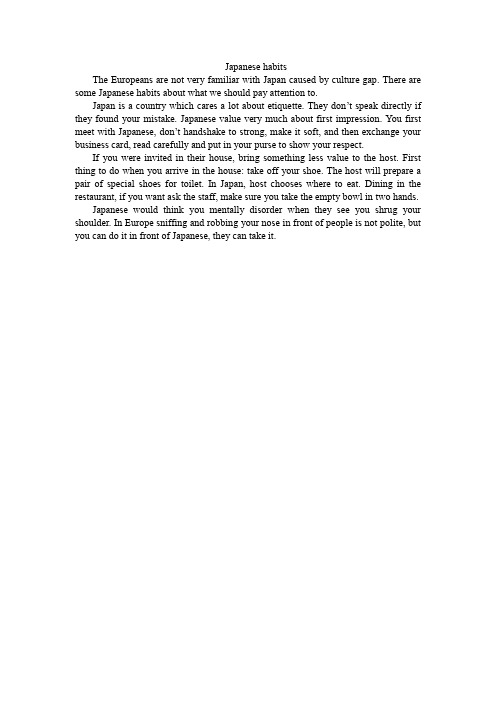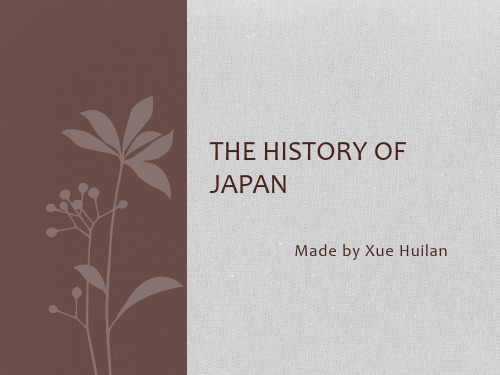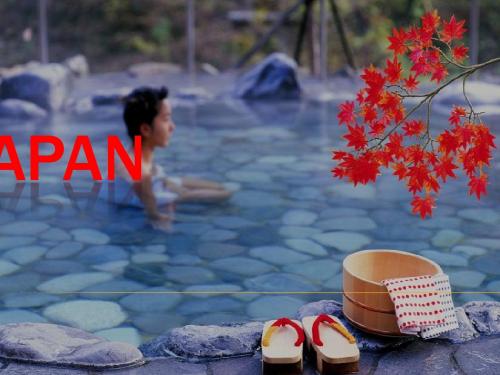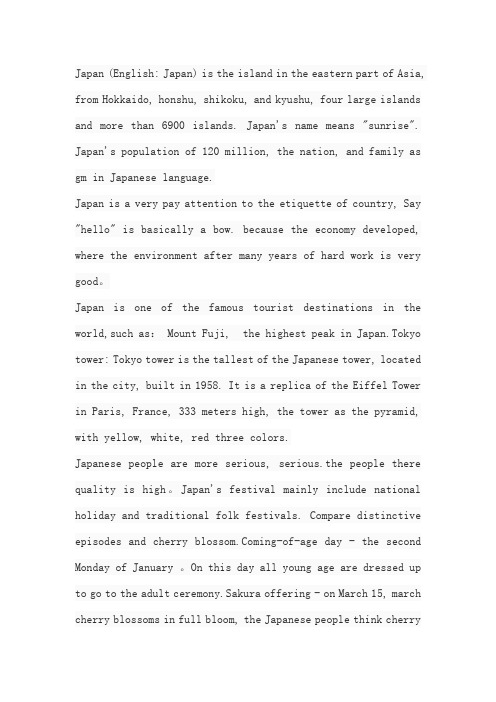JAPANESE
- 格式:doc
- 大小:57.00 KB
- 文档页数:13

Japanese habitsThe Europeans are not very familiar with Japan caused by culture gap. There are someJapanese habits about what we should pay attention to.Japan is a country which cares a lot about etiquette. They don’t speak directly if they found your mistake. Japanese value very much about first impression. You first meet with Japanese, don’t handshake to strong, make it soft, and then exchange your business card, read carefully and put in your purse to show your respect.If you were invited in their house, bring something less value to the host. First thing to do when you arrive in the house: take off your shoe. The host will prepare a pair of special shoes for toilet. In Japan, host chooses where to eat. Dining in the restaurant, if you want ask the staff, make sure you take the empty bowl in two hands.Japanese would think you mentally disorder when they see you shrug your shoulder. In Europe sniffing and robbing your nose in front of people is not polite, but you can do it in front of Japanese, they can take it.。


japan英语作文英文回答:Japan is a country with a rich and diverse culture that has captivated the world for centuries. From its ancient traditions to its modern innovations, Japan offers a unique blend of the past and the present.One of the most striking aspects of Japanese culture is its emphasis on aesthetics. The Japanese people have a deep appreciation for beauty in all its forms, from the delicate blossoms of cherry trees to the intricate designs of traditional tea ceremonies. This love of beauty isreflected in every aspect of Japanese life, from the architecture of their temples to the presentation of their food.Another important aspect of Japanese culture is its strong sense of community. The Japanese people place great value on harmony and cooperation, and they work together tocreate a society that is both prosperous and peaceful. This sense of community is evident in the way that the Japanese people care for their elderly, support their neighbors, and participate in local festivals and events.Japan is also a country with a deep respect for tradition. The Japanese people have preserved many of their ancient customs and traditions, and they continue to play an important role in Japanese life. This respect for tradition is evident in the way that the Japanese people celebrate their festivals, perform their rituals, and wear their traditional clothing.In addition to its rich culture, Japan is also a country with a vibrant economy. The Japanese economy is one of the largest in the world, and it is known for its high levels of innovation and productivity. Japan is a world leader in many industries, including electronics, automobiles, and robotics.Japan is also a country with a strong commitment to education. The Japanese people believe that education isthe key to success, and they invest heavily in their schools and universities. The Japanese education system is one of the best in the world, and it produces highly skilled and knowledgeable graduates.Finally, Japan is a country with a rich history. The Japanese people have a long and proud history, and they have played an important role in the development of East Asia. Japan has been involved in many wars and conflicts over the centuries, but it has also experienced periods of great peace and prosperity. The Japanese people are resilient and resourceful, and they have always managed to overcome adversity.中文回答:日本是一个拥有丰富多彩文化的国家,几个世纪以来一直吸引着全世界。



Japan (English: Japan) is the island in the eastern part of Asia, from Hokkaido, honshu, shikoku, and kyushu, four large islands and more than 6900 islands. Japan's name means "sunrise". Japan's population of 120 million, the nation, and family as gm in Japanese language.Japan is a very pay attention to the etiquette of country, Say "hello" is basically a bow. because the economy developed, where the environment after many years of hard work is very good。
Japan is one of the famous tourist destinations in the world,such as: Mount Fuji, the highest peak in Japan.Tokyo tower: Tokyo tower is the tallest of the Japanese tower, located in the city, built in 1958. It is a replica of the Eiffel Tower in Paris, France, 333 meters high, the tower as the pyramid, with yellow, white, red three colors.Japanese people are more serious, serious.the people there quality is high。
日本风俗与禁忌(Japanese customs and taboos)Most Japanese believe in Shinto and Buddhism, they do not like purple, think purple is a sad tone; the most taboo green, think green is ominous color. Also taboo 3 people together "group photo", they think the middle is about two people clip, this is unfortunate omen. Japanese taboo lotus, that the lotus flower is lost. When visiting patients, avoid using camellias and pale yellow and white flowers, and the Japanese are reluctant to accept gifts or gifts with chrysanthemum or Chrysanthemum patterns, because it is a sign of the Royal family. Japanese like patterns are pine, bamboo, plum, duck, turtle and so on.Language tabooJapanese language there are many taboos, such as "bitter" and "death", and even some of homophonic words are list of taboo, such as the numeral "4" the same pronunciation and death, "42" is the pronunciation of the verb to die shape, so there is no general hospital in 4 and 42 of the rooms and beds. Taboo phone users with "42", not the general prison number 4. "13" is also taboo figures, many hotels do not have "13" floor and "13" room, Haneda airport also does not have "No. 13" apron. At weddings and other festive occasions, said that to avoid, return, return, off, broken, thin, cold, light, and repeated, again, broken off, etc. and Kyrgyzstan bad language. When shops are opened and new stores are completed, do not mention fireworks, closures, crashes, tilts, drains, decay, and language associated with fire. Anti human physical defects on the conversation, not as large, dwarf, pier, bald, deaf, dumb and blind, his words, and that for people with physical disabilities, said blind eye isnot free, called for the deaf ears are not free.behavioral tabooJapan has a "disciplined society", saying that people's behavior is subject to certain regulatory constraints. In formal social occasions, men and women have to wear a suit, dress, bogey disheveled, and chokeable loudly. Communication, folding, letter stamp affixed to law rules, such as sending condolences to the letter Jiyong double envelope, is considered to be double love letters sent to the Disasters pile up on one another.; stamps can not lose, otherwise means john. In the diet taboo Japanese are also many: generally does not eat the fat and pig offal, some people do not eat mutton and duck; guests will be filled with taboo food too much, nor a spoon filled a bowl; guests eat a bowl of taboo is enough, only eat a bowl as a symbol of free margin; taboos during the meal to arrange their own clothes or hands, touch your hair, because it is not health and bad manners; Japanese use chopsticks when the bogey put chopsticks in the dishes on top. In Japan, when you greet a waiter, you have to hold your arms up, palm down, and wiggle your fingers. The waiter will understand. In negotiations, the Japanese use the thumb and index finger to be "O". If you nod your head, the Japanese will think you will give him a cash. In Japan, the use of your scalp is a sign of anger and dissatisfaction.Social tabooJapanese gifts, send gifts in pairs, as one of the pens, two bottles of wine is very popular, but the red envelope sent tonewly married couples, taboo to send 20 thousand yen and 2 times, the Japanese folk think that the number 2 is easy to cause the breakdown of marriage, usually send 30 thousand or 70 thousand yen, 50 thousand. Gift wrapping paper also pay attention to the color, black and white on behalf of the funeral, green is ominous, also should not use red wrapping paper, the best use of color paper gift packaging. Japanese guests are not in the office, but in the conference room, reception room, they will not easily lead people into the confidential departments. Business is unpopular in Japan, and business people do not carry the custom of attending the party. The business party is a cocktail party at the big hotel. Japanese no smoke with each other and habits. You must take off your shoes when entering a Japanese house. In Japan, it is impolite to spy on the host's kitchen when visiting the host's home. In Japan, you don't have the habit of asking colleagues to come home and associate with your family. The Japanese never bring work to the home, and their wives do not take part in their husbands' work as a virtue.Courtesy introductionWhen Japanese meet, they bow with ceremony. In general, people are 3O and 45 degrees of bow, bow, bend different depths, meaning is also different, bending the lowest and most polite bow called "the most salute."". When a man bows, his hands fall naturally on both sides of his underwear. When he shows his respect to each other, he puts his left hand on his right hand and puts on his bow, which is especially true for women.In international relations, the Japanese are also accustomed to handshake ceremony, especially young people or contact withpeople in Europe and America more people, but also began to meet the habit of shaking hands.In Japan, the use of business cards is quite extensive, especially for businessmen who have the habit of exchanging cards when they meet for the first time. Business card exchange is given to a person with a low status or a younger party, which is considered a courtesy. When you hand in your business card, direct it to the other party. Name card written as "thorn" in Japanese, women are smaller than men's name card name card.Japanese are very particular about sitting posture. In the company, Japanese sitting chair, but at home, Japanese still take a "tatami" tradition. Sit in the right seat tatami called "block", namely the knees together and knees hips pressure on the heel. Easy sit "SAT" and "cross sit": "sit cross legged" that the feet cross in front of the hips forward, this is the male sit; "sit cross" is a lateral side of the body legs, not on feet, this is often the women sit. Now, do not take the "tatami" the younger generation is gradually increasing.The way of getting along with people Japanese attitude, high efficiency, and show discipline and strong self-control. Appointments are always on schedule and rarely by mistake.Love is not Japanese impatience with the tit for tat actions style, good at controlling their own actions as a virtue, that they treat a low profile, avoid staring when they talk to each other, bowing to show modest educated. In social activities, Japanese love with the modest language, such as "please", "take care of ill, homely fare", while talking to him often uselanguage.In daily life, the Japanese are modest, courteous and courteous, and seldom quarrel among colleagues or pedestrians. In Japanese conversation, don't you at all, do not interrupt when others speak. When talking to more than three people, be careful not to snub most of them. In conversation, do not ask the Japanese age, marital status, wages and other private matters. The old men and women do not use the "old" and "old age" and other words, the higher the more taboo. It is better to speak little in public. Japan took the subway or bus, rarely see self-assured or supercilious and talk loudly phenomenon. Unless prearranged, otherwise do not rashly visit Japanese family.According to the Japanese customs, drinking is an important ritual, the masters of their guests in Zhenjiu, immediately took the bottle to the owner of Zhenjiu, Zhenjiu each other in order to express the equality and friendship between subjective and objective. Zhencha, Japanese manners is to pour to 80% with the most respectful guests.Japanese to the elderly birthday, is to choose some specific meaning of age. Such as 61 years as the "calendar", meaning the 6O is 1 years old, youth; 7O years old for "Seventy"; 77 years as the "longevity"; 88 "yonehisa", because Chinese characters "m" apart can become eighty-eight; 99 years as the "Baishou", because the word "white" above a bar as "100".tabooThe Japanese have a lot of stress in their daily behavior, andthere is a lot of taboo in saying "heavy". If you speak loudly, stare intently at others, hand in your pocket, and finger pointing to people, will be considered disrespectful. In the exchange name card when taboo out or loaded from the rear pocket, it is not respect for people's behavior. Avoid the three side by side photo, it is because the station in the world people have suspected heteronomy. To avoid subsidizing stamps, because it implies that diplomatic relations. To Japan, a guest should be booked in advance, please don't enter, not love don't sit,。
∙学习日语的十大原则∙ 1.“三皮”原则要想征服日语,首先,头皮要硬!无论碰到多大的困难,也不要放弃!其次,嘴皮要勤!时时刻刻操练;俗话说:拳不离手,曲不离口!只有嘴皮勤,才能把说惯了中文的嘴练成中文日文同样流畅!第三,脸皮一定要厚!不要怕别人笑话,别人越笑,越要充满激情地、起劲地、加油地练习,一定要用一口流利的日语证明他们是错误的、愚蠢的、短视的!不要面子要里子!環境を変えることはできない、しかし、自己の考え方は変えることができる。
(你不可能总是控制环境,但你可以控制自己的思想。
)2.“三大”原则苦练日语时,一定要“大声说”,因为只有大声说才能刺激你的听觉,增强你的自信,加深你的记忆,达到终生不忘,中国人读外语的声音实在是太小了!与日本人交流时要“大胆说”,不要害怕犯错误,要热爱丢脸。
记住:犯的错误越多,纠正的错误也就越多,进步才越大。
我们天生就会讲世界上最难的汉语,日语又算得了什么呢?没什么了不起。
要保证日语的成功,还必须要“大量说”,要让你的口腔肌肉不停地运动,量变才能引起质变。
练习的量如果不够,你再刻苦学日语也是没有用的。
望失敗に失するな。
もし挑戦しないなら、それは失敗と同じなのだから。
(失败了,你也许会失望;但如果不去尝试,那么你注定要失败。
)3.“三一”原则学习日语,第一,就是“一个单词一个单词读准”,只有将每个单词读准,才能听懂、才能说清,听力、口语才能同时获得巨大进步。
第二,要做到“一个句子一个句子读顺”,只有这样你才能牢固地掌握单词和语法,你的日语才流利、才悦耳动听!你的日语水平将决定于你能脱口而出的句子量!第三,要“一篇文章一片文章读烂”,这样你说出来的日语就不再是孤立的单词或句子,而是一段一段,一篇一篇,你才能做到滔滔不绝!才能让日本人对你的敬佩之情如滔滔江水,绵延不绝。
背诵后活用是学好日语的最终出路!頭脳は鍛えてこそ、健康を保持することができる、体と同じである。
(大脑需要锻炼才能保持健康,就象你的身体一样。
)4.“三最”原则这是明正激情日语的核心学习法,从根本上解决了不会说日语的问题。
在操练日语的时候,一定要做到:最大声、最清晰、最快速。
这就是明正老师著名的“三最” 练习法。
“最大声”可以帮助你克服羞怯和自卑,说出自信与豪迈,同时训练听力!“最清晰”可以帮助你做到字正腔圆!“最快速”可以强行锻造你的口腔肌肉,使之早日中日同化!这个方法也可以大大改进你说汉语的能力!用“三最练习法”读单词、读句子和文章!经过一段时间的刻苦操练之后,当你一旦用日语与日本人交流时,稍微一紧张最大声自然变成“正常音量”,最快速就变成了“合适稳定的语速”,最清晰则变成了“略显含糊的日语最高境界”。
“三最练习法”可以快速培养你的语感,让你的考试成绩获得大幅度提高!这是个神奇的方法,你一定要试!现在就开始!情熱を失っては、何もできない。
(失去热情就干不了任何大事。
)5.“三餐”原则谁都不会忘记吃饭,但大家都会忘记读日语!这就是人性的弱点!这也是为什么人不会因为忘记吃饭而饿死,但却因忘记随时操练日语而变成“聋哑日语”!一定要将三顿饭、起床睡觉这些“每日必做” 的事情和学日语联系起来!如果你能坚持半年,每顿饭前做一道阅读理解,每顿饭后将这道阅读理解题“狂读十遍”,那日语二级、日语一级,高级口译证书对你来说简直是小菜一碟!明正的许多同学通过这个方法在日本语能力测试中获得了350分以上的好成绩!只要你能坚持,你就一定能成功!饭前学日语思索人生,饭后学日语有助消化!いつも食事の前に本を読むこと。
この習慣が確実に成功をもたらす。
(经常要在饭前读书,好习惯是成功的保证。
)6.“舌次”原则是否能攻克日语、是否能讲一口流利的日语,这和“舌次”密切相关!“舌头每天动的次数”一定要超过1000次!这样才能保证你舌头的灵活度,才能改造你的口腔肌肉,才不会笨嘴拙舌。
也只有这样才能培养你的“非凡语感”!“舌次”将决定你的日语最终是否能成功!我们建议你一天除去上课时间以外起码要再读八次日语:早晚各一次,每次30分钟;三顿饭前后各一次,每次10分钟!坚持下去,直至养成习惯!好的习惯就等于成功!仕事での大きな成功は、能力によるものではない、たゆまぬ努力と強い意志によるものである。
(伟大工作的完成不是靠力量,而是靠坚持不懈的意志。
)7.“录音带”原则学日语一定要跟着“发音纯正的录音带”一起读!没有纯正的录音,干脆别学日语!最标准纯正的录音带就是日语等级考试过去的真题录音带,录音带是最便宜、最有效、最忠诚、最耐心的学习伴侣!把录音带放在你的复读机里,随时随地跟读操练,这样效果最好!你从开始学日语至今,曾经“一丝不苟地”彻底模仿过一盒录音带吗?如果没有,赶紧去做吧!(我们的调查结果是:几乎没有人曾经这么做过!所以没几个人能讲一口流利的日语!)明正激情日语制作的任何一套录音带都会带你走上纯正日语的光明大道!大きなことができないのならば、大きな想いで、小さなことをすればよい。
大きなチャンスを待つのではなく、毎日の小さなチャンスをつかみ取り、大きなチャンスに変えるのだ。
(如果不能成就伟大的事业,那么就以伟大的方式去做渺小的事情。
不要空等伟大的机会,要抓住每天的普通机会,使它们变得伟大。
)8.“小纸条”原则这是最原始、但最有效的学习方法。
纸条满天飞,环境随身带!走到哪里学到哪里!将难单词、难句子统统抄在纸条上,随身携带,一有时间就拿出来操练。
特别是日语二级、一级、日语口译证书的试题!脱口而出考试题,口语考级双修成!恵まれた環境での成功を期待してはならない。
小さなチャンスを地道に見つけ、つかみ取るのだ。
(不要期望依靠非凡的境域取得成功,要抓住每一个平常的机会。
)9.“重复”原则不要担忧自己的记忆不好,记不住只是因为你重复的次数还不够!感到困难大,也只是因为你重复地不够!一定要重复到100遍、1000遍,直至脱口而出!再难的东西也经不起反复操练,任何困难都会在重复的力量下屈服!记住:重复创造奇迹!重复造就天才!どんな困難にも打ち勝とうとする強い決心があれば、挫折に負けることなどない。
(挫折摧不垮我,任何挫折都会向坚定的决心屈服。
)10.“脱口而出”原则请记住明正老师的经典口号:看懂是不够的,听懂是必须的,说出来才是自己的!脱口而出是检验是否学有所成的唯一标准!学日语最有效的方法就是:不脱口而出第一句,坚决不学第二句!学过之后要活学活用,现炒现卖。
看到日本人就跟他聊,实在没条件找不到日本人,就和朋友、同学讲。
也可以背诵很多文章,找机会说出去,立刻获得刺激和成就感!不要错过任何脱口而出的机会!只有将你学到的东西脱口而出才算是真正学到了东西,才叫学有所成!记住:日语越说就越流利!抛弃羞怯,大胆的说吧!∙谈如何记日语单词∙时间:2008-8-6 21:29:25 来源:本站原创作者:alex∙学习日语的人常感记词困难。
日语词确实难记,因为难寻规律。
学习印欧语系诸语,可用词素分析法将词分解为词干和词缀,加以整理,即便利于记住。
日语词不是这样由词干和词缀构的,词素分析法用不上。
日语词的来源不一,构成方式复杂。
有和语词,有汉语词,有混合词,有派生词;此就其来源而论。
在读音方面,有音读,有训读,有音训混读;同为音读,尚可分为汉音,吴音、唐音等等。
因而日语词的状况复杂,难读难记。
学习者以记词为苦,是有基因的。
要彻底解决记日语这一难题,唯一有效的办法就是掌握日语词的音读。
音读和训读有其规律,抓住纲目,分清条理,是记词的关键。
只要抓住音和训,记词即非难事。
但因音读和训读状况极其复杂,不加深究,则无法弄清其实际,所以学习者感到无从下手。
同一汉字,在这个词里音读,在那个词里训读;况且音读和训读都有数种读法,更使人无从掌握。
为了顺利地记住日语词,首先必须弄清什么是音读和训读。
自从汉语和日语发生关系以来,就在日语中引起了这个问题;这是个十分古老的问题。
在汉字进入日本以前,日本没有文字。
汉字和汉语进入日本以后,日本人不但汉字注日语音,而且大量吸收汉语词。
由此而产生音读、训读、音训混读以及有关诸多问题,日语词的复杂状况即由此而生。
因此,弄清音和训是记住日语词的关键。
下面简单谈谈什么是音读和训读以及有关问题,由此而探讨解决记词的难题。
训读:训读是用日语读汉字(汉语词)。
汉字进入日本后,日本人按该汉字的原意而用日语读出。
例如汉字“川”的意思就是“河”,日语词称“河”为“カワ”,于是就将汉字“川”读为“カワ”。
这就是训读。
总之,依汉字愿意而以相应的日语词读出,就是训读。
训读是写汉字,读日语的音。
例如“人”读“ヒト”,“山”读“ヤマ”,等等。
这也可以说是类似翻译,但有些是确切的翻译,有些则不一定完全相符。
音读:汉字进入日本后,日本人按照汉字的原音读汉字,就是音读。
因汉字传入日本时间不同,而有古汉音、吴音、唐音等等之别。
总之,日语汉字的读音来源于古汉语读音,故虽与现代汉语音常不一致,但仍有关系。
例如汉字“山”,日语音读为“サン”,“爱”读为“アイ”,等等。
可见日语汉字的音读皆源自古汉语音,由于汉语音与现代汉语音虽不尽相同,但仍密切相关,所以日语汉字音读与现代汉语音也有联系。
除音读和训读外,还有音训混读,就是在一个词内,有的汉字音读,有的汉字训读,形成音训混合全体。
产生这个现象的原因并不在于汉字的读法,而主要是由于日语中的造词所引起的。
仅据以上简述即可明显看出日语词呈现复杂现象的根源,同时也说明要解决日语词的难记,就必须抓住音和训这个根源。
否则,抓来抓去,总在枝节上转圈子,终究不得出路。
我们列出了五十音图“あ”行至于“わ”行的全部音读汉字和训读汉字。
虽然各行的音读和训读有多有少,甚至多少悬殊,有的音读汉字多而训读汉字少;有的反之,音读汉字少而训读汉字多;有的两者多少大体均等。
情形虽是千差万别的,但不论情形如何,有一点是确定不变的,那就是:日语汉字的读音——包括音读和训读——是稳定的,固定的,大体上是不变的。
如前所述,汉字的读音稳定,构成词时,词的读音也是稳定的。
例如汉字“生”字,它的音读为“せい”,所以它所构成的词:“学生”、“先生”、“生活”、“生物学”等,它们的“生”字都读做“せい”。
音读是如此,训读也是如此。
例如“手”字训读为“て”,于是它构成大量训读词如:“手痛い”、“手利き”、“手提”、“手塩”……等等,“手”字都训读为“て”。
由此我们找到记住日语的关键,寻得记住日语词的窍门。
因为不论汉字是音读或是训读,在构成词时其音相当稳定,这正是我们发现的窍门,找到的关键。
西文的语言,印欧语系诸语,它们的词可依词不达意素分析法而划分为词根(词干)和词缀(后接部分);这样划分,即可形成条理,找出规律,得出构词的要领,以便于记住单词。
日语与印欧语系诸语完全不同,其构语法是另一个样子,词素分析法用不上。